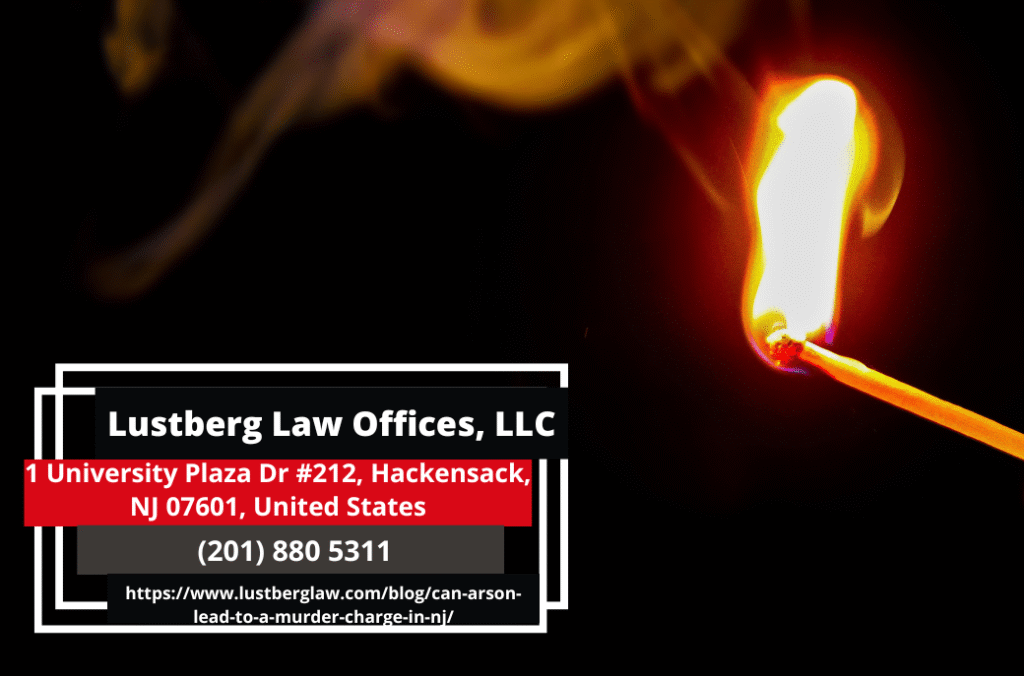Can arson lead to a murder charge in NJ? It’s a question many people never think to ask until they’re facing the possibility of life-changing criminal charges. In New Jersey, arson is not just a property crime. Understanding how arson can escalate into a homicide case is essential, especially since the law doesn’t require proof that you meant to kill anyone. What matters is the link between the fire and the fatal outcome.
If you or someone you care about is under investigation or has been charged with arson, particularly in a case involving injury or death, it’s critical to act fast. A skilled New Jersey arson attorney can examine the evidence, challenge the prosecution’s case, and work to protect your rights at every stage. Contact Lustberg Law Offices, LLC today. Call (201) 880-5311 to schedule a confidential consultation and begin building a strong defense.
When a Simple Fire Turns into a Homicide: What You Need to Know in New Jersey
Setting a fire may seem like a property-related offense at first glance, but in New Jersey, the consequences can escalate rapidly if a death occurs. Intentional or not, the fatality could lead to homicide charges depending on your actions, your intent, and how predictable the death was.
The Critical Role of Culpability
In fire-related homicide cases, your mental state, or “culpability,” is the legal cornerstone. Prosecutors must establish what was in your mind at the time the fire was set. If they can prove that you started the fire purposely or knowingly causing death or serious bodily injury that results in death, you could be charged with murder under N.J.S.A. 2C:11-3.
- Purposely: You act purposely if it is your “conscious object” to cause death or serious bodily injury. For instance, igniting a house with the specific goal of killing someone inside is a purposeful act.
- Knowingly: You act knowingly if you are aware that death or serious bodily injury is “practically certain” to result from your conduct. Setting fire to an occupied building, even if your primary goal was just to destroy property, could be considered a knowing murder if a death was practically certain to occur.
Your state of mind can be shown through your words, actions, or planning. Did you express a desire to hurt someone? Did you make threats beforehand? Were there signs you knew others were inside the building when you lit the fire? Even if the evidence doesn’t meet the high bar for murder, your mindset will still influence whether you’re charged with a lesser but still serious crime like manslaughter.

What Happens When a Death During a Fire is Unintentional?
Not every fire set with no intention to kill is treated lightly. You may still face serious homicide charges if your conduct was reckless. New Jersey law distinguishes between two levels of manslaughter based on the degree of recklessness involved.
- Reckless Manslaughter (N.J.S.A. 2C:11-4b(1)): This second-degree crime occurs if you recklessly cause a death. Recklessness means you consciously disregarded a substantial and unjustifiable risk that someone could die.
- Aggravated Manslaughter (N.J.S.A. 2C:11-4a(1)): This is a more serious, first-degree crime. It applies when you recklessly cause a death “under circumstances manifesting extreme indifference to human life”. This legal standard goes beyond simple foreseeability; it requires that your actions created a probability of death, not just a possibility. For example, setting a fire in a crowded apartment building at night would likely be seen as manifesting extreme indifference to human life.
How New Jersey Law Escalates an Arson Charge to Murder
New Jersey law also uses the felony murder doctrine, found in N.J.S.A. 2C:11-3a(3), to elevate arson into a murder charge, even if killing someone wasn’t your intent. If someone dies during the commission of arson or during your attempt to flee from the scene, you can be charged with felony murder. The rationale is simple: committing a dangerous felony puts lives at risk, and the law holds you accountable for any fatal outcomes.
Take this example: you set fire to a building to commit insurance fraud, and a firefighter dies battling the flames. Even if you had no idea a first responder would be harmed, you’re still legally responsible for that death. The same principle applies if a civilian inside dies from smoke inhalation or injuries sustained during evacuation. Because arson is inherently dangerous, the law presumes you accepted the possibility of fatal consequences.
New Jersey Arson Lawyer Adam M. Lustberg

Adam M. Lustberg
Adam M. Lustberg is a Certified Criminal Trial Attorney in New Jersey with nearly 20 years of experience defending clients in complex criminal cases, including arson and other serious felony offenses. A graduate of Seton Hall University School of Law, Mr. Lustberg has developed a reputation for his tactical precision, courtroom strength, and unwavering advocacy for his clients’ rights.
As the founder of Lustberg Law Offices, LLC, he has handled a broad range of criminal matters across state and federal courts, providing aggressive defense strategies in high-stakes arson investigations and prosecutions. His recognition includes being named a Rising Star by Super Lawyers for six consecutive years, earning a place among The National Trial Lawyers Top 100, and being featured in (201) Magazine’s Bergen’s Best Lawyers.
What Legally Counts as Arson in NJ?
In New Jersey, arson laws go beyond simply striking a match. A person can face arson charges for any fire-related act that poses a threat to life, property, or public safety. Even burning your own property can lead to prosecution, especially if the fire endangers others or is done for financial gain. When injury or death results, the stakes become even higher. Here’s how arson is defined under New Jersey law and what can make the charges more severe.
Burning a Building (Why the Type of Property Matters)
Under N.J.S.A. 2C:17-1, the severity of an arson charge often hinges on the kind of property involved. Fires that damage buildings, especially ones used by people, are treated more harshly than those involving other objects.
- Structures (like homes, offices, and public buildings) are prioritized due to the risk to human life.
- Places of worship are particularly protected by law, and targeting them can result in enhanced penalties.
- Fires in occupied spaces (apartment buildings, stores, schools) are more likely to result in second-degree or higher charges because of the danger posed to occupants.
Understanding the Difference Between Simple and Aggravated Arson
New Jersey law classifies arson into two main categories based on intent and risk level:
Simple Arson (Third-Degree Crime)
- Involves setting a fire that damages property or endangers structures without directly intending harm.
- Includes burning your own property for insurance fraud.
- Often involves reckless behavior, not purposeful harm.
Aggravated Arson (Second-Degree Crime)
- Applies when someone sets a fire to intentionally destroy someone else’s property or knowingly puts others at risk.
- Includes fires set in occupied buildings or situations where someone is paid to commit arson.
- Treated far more seriously due to the high potential for injury or death.
Common Motives Behind Arson
Why someone starts a fire can significantly influence how the case is charged and prosecuted. While the underlying act may be the same, the reason behind it often shapes the severity of the charges and the strategy used by the prosecution.
Insurance Fraud
One of the most common motives for arson is financial. A person may intentionally burn their own home, vehicle, or business in order to collect insurance money. This is often tied to debt, foreclosure, or financial desperation. While it may seem like a victimless crime, it becomes highly serious if others are placed in danger or emergency responders are injured.
Revenge
Arson is sometimes used as a weapon of retaliation, damaging someone else’s property to “get back” at them. It could be an ex-partner, employer, or neighbor. Revenge-motivated fires are seen as intentional and malicious, which increases the likelihood of facing aggravated arson charges.
Vandalism or Thrill-Seeking
Younger individuals or groups may set fires simply for the excitement or to cause chaos, without fully understanding the danger. This impulsive behavior, while lacking a clear intent to harm, still results in significant criminal liability if property is damaged or people are endangered.
Covering Up Another Crime
In some cases, a fire is used to destroy evidence of a separate crime, such as theft, assault, or even homicide. This motive can drastically escalate the legal consequences, as it may lead to multiple charges, including obstruction of justice and tampering with evidence, in addition to arson.
Extreme Carelessness
Sometimes, fires start not out of malice but due to a complete disregard for safety. Playing with fireworks, using open flames near flammable materials, or leaving fires unattended can all lead to devastating consequences. When this kind of reckless behavior leads to destruction or injury, it may still result in serious criminal charges, even if the intent to harm wasn’t present.
Penalties for Arson in New Jersey: What You’re Up Against
Being convicted of arson in New Jersey comes with severe penalties that can impact your freedom, finances, and future. The consequences depend on the degree of the charge. Below is a breakdown of what’s at stake if you’re found guilty.
Second-Degree Crime: Aggravated Arson
Aggravated arson is charged as a second-degree felony, and New Jersey law presumes imprisonment for anyone convicted, even first-time offenders.
Potential Penalties:
- 5 to 10 years in prison
- Up to $150,000 in fines
- Mandatory restitution to victims for property damage or injuries
- Ineligibility for parole in some cases
- A felony conviction on your permanent criminal record
Third-Degree Crime: Simple Arson
Simple arson is a third-degree felony and is still a serious offense, though it does not carry a presumption of incarceration for first-time offenders.
Potential Penalties:
- 3 to 5 years in prison
- Fines up to $15,000
- Restitution for any losses or damages caused by the fire
- A lasting felony record, which can impact job prospects and housing
If a fire causes injury or death, the penalties become much more severe. Aggravated manslaughter can lead to 10 to 30 years in prison, while reckless manslaughter carries 5 to 10 years.
In the most serious cases, you could face felony murder under N.J.S.A. 2C:11-3a(3), which means 30 years to life in prison without parole for 30 years. These charges can apply even if the death was unintentional, as long as it happened due to the commission of arson.
The Lasting Consequences After Prison
A felony murder conviction doesn’t just affect your freedom; it affects nearly every part of your life, long after incarceration ends. Upon release, you’ll carry a permanent criminal record for one of the most serious violent offenses recognized by law. This can make it incredibly difficult to:
- Find housing, as landlords can deny applicants with felony records
- Get a job, since employers routinely screen for violent criminal history
- Reclaim civil rights, such as voting while on parole and ever owning a firearm (which is permanently prohibited)
The stigma and legal restrictions of a felony murder conviction can follow you for the rest of your life, making reintegration into society an uphill battle.
Worse still, the victim’s family may file a civil wrongful death lawsuit against you. This is separate from the criminal case and has a lower burden of proof: “a preponderance of the evidence” (more likely than not) rather than “beyond a reasonable doubt”. If successful, the court may award damages for financial losses like lost income and funeral expenses.
Under New Jersey’s Wrongful Death Act, punitive damages to punish the offender are generally not recoverable, but a separate “survival action” may allow the estate to sue for the victim’s pain and suffering before death. These financial judgments can reach hundreds of thousands or even millions of dollars and cannot be eliminated through bankruptcy.
Key Strategies When Fighting Arson and Murder Allegations in New Jersey
Facing arson and felony murder charges in New Jersey is one of the most serious legal situations anyone can encounter. The penalties include decades in prison, steep financial costs, and permanent damage to your record and reputation. However, there are several potential strategies to challenge these allegations depending on the facts of your case. A thorough, detail-focused defense can make a critical difference.
Challenging the Evidence Behind the Fire
A key component in any arson case is proving that the fire was set intentionally. If the prosecution cannot demonstrate that the fire was deliberately started, they do not have a case for arson or felony murder based on arson.
Your defense may challenge:
- The cause of the fire: Was it really arson, or could it have been caused by something accidental, such as faulty electrical wiring, a space heater, or improperly stored chemicals?
- The reliability of the fire investigation: Fire scenes are complex and prone to misinterpretation. Expert testimony can be introduced to question the original fire investigator’s methods or conclusions.
- Alternative explanations: Presenting a credible alternate theory about how the fire started can introduce reasonable doubt, which is often enough to weaken the prosecution’s case.
Disputing the Link Between the Fire and Death
To convict someone of felony murder based on arson, the state must show that the death occurred as a direct result of the fire and during the course of committing or fleeing from the crime. If the connection between the fire and the death is unclear or too remote, the felony murder charge may not hold.
Your defense could argue:
- The death was not foreseeable: If it was highly unlikely that anyone would be harmed by the fire, such as in a structure believed to be empty, this may undercut the felony murder element.
- The death happened under unrelated circumstances: For example, if the person died later from unrelated injuries or in a way not directly caused by the fire (e.g., a vehicle crash while evacuating), this may fall outside the scope of felony murder under N.J.S.A. 2C:11-3a(3).
- Timing and location: If the death occurred well after the fire or in a different setting, it may not meet the legal requirements for felony murder.
Presenting a Defense Based on Lack of Involvement or Identity
Not all defenses are technical. Some are straightforward. If you were not involved in the crime at all, your legal team can build a strong case focused on proving your innocence.
Potential defenses include:
- Alibi: Evidence such as surveillance footage, GPS records, receipts, or witness testimony showing you were somewhere else at the time of the fire can be powerful.
- Mistaken identity: Fires often create chaotic scenes with limited visibility, which can lead to unreliable eyewitness identification. Challenging the way police identified you, such as through suggestive photo lineups or vague descriptions, can cast doubt on the prosecution’s case.
- Legal defenses under the felony murder statute: New Jersey law provides specific protections in certain situations. If you did not commit the act that caused the death, were unarmed, had no reason to think anyone else was armed, and had no intent to cause death or serious injury, you may be eligible for a defense under N.J.S.A. 2C:11-3a(3).
If you or a loved one is facing these charges, time is critical. Early intervention by an experienced criminal defense attorney can uncover weaknesses in the state’s case, preserve crucial evidence, and begin developing a strategy that protects your future. The earlier you act, the stronger your defense can be.
| Defense | Expanded explanation or evidence | Legal statute or context |
|---|---|---|
| Alibi: Evidence such as surveillance footage, GPS records, receipts, or witness testimony showing you were somewhere else at the time of the fire can be powerful. | Strong alibi evidence, such as surveillance, cell phone GPS, receipts, or witness statements, can prove you were not at the crime scene. Prosecutors may challenge alibis if notice is not given or the evidence is weak. | Alibi is a recognized factual defense; procedural rules in New Jersey require timely notice to the court. |
| Mistaken identity: Fires often create chaotic scenes with limited visibility, which can lead to unreliable eyewitness identification. Challenging the way police identified you, such as through suggestive photo lineups or vague descriptions, can cast doubt on the prosecution’s case. | Eyewitness misidentification is a leading cause of wrongful convictions. You can challenge issues such as poor lighting, stress, memory errors, or suggestive police procedures. | Mistaken identity is a factual defense; courts review eyewitness reliability under due process standards. |
| Legal defenses under the felony murder statute: New Jersey law provides specific protections in certain situations. If you did not commit the act that caused the death, were unarmed, had no reason to think anyone else was armed, and had no intent to cause death or serious injury, you may be eligible for a defense under N.J.S.A. 2C:11-3a(3). | This is an affirmative defense under New Jersey’s felony murder statute. You must prove that you were not the killer, were unarmed, and had no reason to believe others were armed or intended serious harm. | N.J.S.A. 2C:11-3a(3) provides this defense for non-slayer participants in certain felony cases such as arson. |
Protect Your Future with Help from Lustberg Law Offices, LLC
Arson cases that involve injury or death are among the most aggressively prosecuted offenses in New Jersey. Even without the intent to harm, a conviction can lead to decades in prison, massive financial penalties, and lasting damage to your reputation and freedom. If you’re facing these charges, you need an attorney who understands the nuances of both arson and felony murder laws.
At Lustberg Law Offices, LLC, we provide experienced, strategic defense for individuals accused of serious crimes throughout New Jersey. We know what’s at stake, and we fight to protect your rights at every turn. Don’t wait to get the legal help you need. Call (201) 880-5311 today for a confidential consultation.






